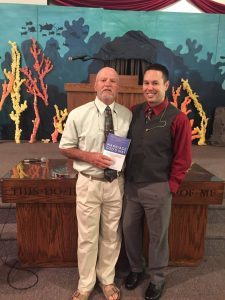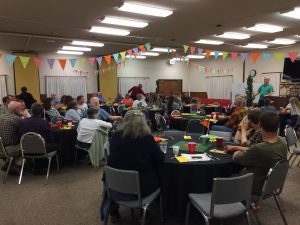Scott LaPierre's Blog: Scott LaPierre | Living God's Way | Pastor, Author, and Speaker, page 42
October 6, 2016
3 Reasons Giving Correction Is Important
 Giving correction is vitally important to the health and joy of marriages, families, churches, businesses, teams, etc. You name it – any group or organization that involves relationships – requires giving correction.
Giving correction is vitally important to the health and joy of marriages, families, churches, businesses, teams, etc. You name it – any group or organization that involves relationships – requires giving correction.
Why is that? We’re sinners. We sin against others and others sin against us. We have to be able to give correction to others, and we have to allow others to correct us. Here are three reasons this is so important!
1. Giving correction protects against bitterness.
When people sin against us, it can create an offense. We have to talk to the person that upset us. The alternative allows bitterness to develop, and it can have far-reaching consequences:
Hebrews 12:15b Lest any root of bitterness spring up causing trouble, and by this many become defiled.
Nothing ruins relationships faster than having an offense but not going to the person that offended you. The hurt festers creating anger and hostility.
We treat people differently when we’re upset with them, perhaps even unknowingly. The person who offended us will say, “You seem different toward me. Did I do something wrong?” We should share how the person hurt us, but we quickly respond in a dishonest way, “No, everything is fine.” We didn’t even know our offense had caused such a noticeable difference in our actions.
2. Giving correction allows relationships to develop.
When correction can’t be given in a relationship, it’s almost impossible to move beyond a superficial level. Relationships that can’t discuss hurts or offenses are completely shallow. A real friendship – whether in a family or in the church – should be able to see either of the following take place:
“You shouldn’t have _______” followed by the response, “Thank you for pointing that out to me.”
“It hurt me when you _______” followed by the response, “I’m sorry for _______, will you please forgive me?”
Proverbs 15:1 says that it is, “to [our] glory to overlook an offense.” But this only applies IF we can do what the verse says and overlook the offense. If we’re still angry about something weeks, months, or – sadly even – years later, we need to go to the person.
3. Giving correction fosters spiritual growth.
Correction is vitally important to our maturity. Sanctification is the Holy Spirit convicting – or correcting – us about an area that needs to be more conformed into the image and likeness of Christ. Often the Holy Spirit will use people in our lives to accomplish this. Those close to us identify blind spots we’ve been unable to see. Whether it’s because of pride or ignorance, there are some issues in our lives that require the help of others to recognize the change that’s needed.
Sometimes we respond poorly by getting upset, making excuses, or trying to turn the tables on the other person. All this does is shortchange our spiritual growth. This is why the Bible places so much emphasis on the way we respond to correction. There are positive or negative consequences associated with the way we respond to correction:
Poverty and shame will come to him who disdains correction (negative), but he who regards a rebuke will be honored (positive) – Proverbs 13:18
Harsh discipline is for him who forsakes the way, and he who hates correction will die (negative) – Proverbs 15:10.
The ear that hears the rebukes of life will abide among the wise (positive). He who disdains instruction despises his own soul (negative), but he who heeds rebuke gets understanding (positive) – Proverbs 15:31-32.
He who is often rebuked, and hardens his neck, will suddenly be destroyed, and that without remedy (negative) – Proverbs 29:1.
Discuss: How do you respond when people correct you? Do you care enough about others to give them correction when it’s needed?
The post 3 Reasons Giving Correction Is Important appeared first on Scott LaPierre.
September 26, 2016
Top Three Things I Learned From My Dad, John LaPierre
 Lots of wonderful friends came out to surprise my dad, John LaPierre, on his 65th birthday.
Lots of wonderful friends came out to surprise my dad, John LaPierre, on his 65th birthday.Friday night was my dad’s surprise 65th birthday party. Different people took turns standing sharing about him, and it was very touching. I’m thankful for all the wonderful friends God has put in my parents’ lives. Also, my dad is a really wonderful man, and it blessed me to see how many others recognize that. I concluded the time of sharing, discussing the top three things I learned from my dad.
First, Dad taught us to work hard
 Front view of the house I grew up in from our visit in 2014.
Front view of the house I grew up in from our visit in 2014.My dad is one of the hardest workers I’ve ever met. When people shared about my dad, this was the most common thing they said, pointing out how he’s such a servant.
When I was growing up, I don’t remember much sitting around. We grew up in the mountains, and it seemed like Dad always had work for us to do. While most of my friends looked forward to summers, I remember thinking it just meant more work around the house. I tried to get a job as soon as I could, because at least then I would make money while working :).
 A view of the house from the road. This rock wall is special to me because of the time Dad and I built it together. We used the rocks we’d taken from the front and backyards when we put in the lawns.
A view of the house from the road. This rock wall is special to me because of the time Dad and I built it together. We used the rocks we’d taken from the front and backyards when we put in the lawns.My parents grew up in New York and moved out to California when I was one. My dad grew up working on his uncle’s dairy farm. The summer after 8th grade I flew back to New York to work on that same dairy farm. That was special to me to be at the place, doing many of the same things my dad did decades earlier.
There were plenty of times I hated how much Dad made us work. I was frustrated that I didn’t get to have as much fun as my friends. Looking back though, I couldn’t be more thankful for my dad’s work ethic and that he tried so hard to pass it along to us.
Second, Dad pointed us toward the Lord as early as I can remember
 After giving Dad the first copy of Marriage God’s Way.
After giving Dad the first copy of Marriage God’s Way.I became a Christian in my early twenties. My parents became Christians a few years later with me being able to baptize both of them. Now Dad serves as a deacon at the church I pastor. This is one reason I was so thankful to dedicate Marriage God’s Way to my dad and give him the first copy at a morning worship service at WCC.
From as early as I can remember my parents talked to me about God and told me Jesus died for my sins. We spent lots of evenings kneeling on the floor in our living room praying together as a family. Church was a priority. I remember almost never missing, including even when we were on vacation. The foundation God built on was laid by my parents, and especially my father.
Third, my dad taught me to take care of my family
 One of my dad’s good friends, golfing partner, and a fellow deacon, Steve Moeller, sharing about my dad.
One of my dad’s good friends, golfing partner, and a fellow deacon, Steve Moeller, sharing about my dad.Dad was a wonderful family man. My mother, brother, and I were the most important parts of my dad’s life. I don’t remember Dad having any hobbies. He worked a lot, and when he wasn’t working he was with us.
Dad also showed me what it looked like for a husband to make his wife a priority. I mentioned earlier that we moved out to California from New York. That’s because my mom’s parents moved out to California, and Dad left all of his family and friends so Mom could be with her parents.
My dad’s commitment to family has continued to this day. When my parents retired they moved to Lemoore, CA to be with us. When we moved to Woodland they sold their home and soon followed us. They’ve sacrificed a lot to be with us, but I believe it’s a sacrifice God has blessed because my parents said their years in Woodland have been the best of their lives.
My Dad sets the example for my family where I fail
 My children adore their grandfather.
My children adore their grandfather.I have plenty of weaknesses as a father and husband. One of the most glaring is in the area of service. I can be selfish, focusing on the things I have to do without thinking about the obligations of others, even those closest to me, like my wife. At times when I do serve, I don’t do so joyfully.
As parents we want to set the best example for our children. This is one more reason I’m so thankful for my dad and the close relationship he has with my children. While I don’t set the best example, he does. I hope they remember the way my dad loved and served others, especially his family and the church.
Happy birthday to my wonderful dad, John LaPierre. As my children get older I’ll feel very blessed if my children looked up to me as much as I look up to my dad.
The post Top Three Things I Learned From My Dad, John LaPierre appeared first on Scott LaPierre.
September 21, 2016
Why we should follow the script (or Scripture)
 Teach Your Child to Read in 100 Easy Lessons
Teach Your Child to Read in 100 Easy LessonsWe homeschool our children, taking them through Teach Your Child to Read in 100 Easy Lessons when they’re around four. We’ve been pleased with the book, including the way the instruction is presented like a script. The words Katie is supposed to say are in red, and our child’s responses are in black. There’s a response provided if a child answers correctly, and a different response if a child answers incorrectly.
“Don’t deviate from the script!”
 Corrective Reading
Corrective ReadingWhen I taught elementary school, I was taught a very similar program, called Corrective Reading. I remember thinking at the training, “Anyone could do this!” One of the most common instructions they told us was, “Don’t deviate from the script.”
Unfortunately, when I went back to the classroom to teach my own students there were times I completely disregarded the instruction I was given:
Sometimes I thought something was unnecessary.
Sometimes I thought I could say it better myself.
Sometimes I thought it would be better if I added something.
Here’s what I noticed very quickly:
When I followed the script, things went well.
When I deviated from the script, there were problems.
If I had to say why I deviated from the script, I believe the answer is obvious. I thought I knew better than the author.
I can’t help seeing the similarities with Scripture. God’s Word is a perfect script for us to follow in our lives, families, marriages, churches, etc. When we deviate from the script – or Scripture – we end up having problems.
We don’t know better than the Author
 The Bible has to be approached with an amount of faith. I don’t mean the kind of faith that says the Bible is the Word of God. Most Christians acknowledge this without hesitation. I mean the kind of faith that says, “God knows best. Even if I don’t understand, I’m still going to obey.” We talk about “walking by faith” and heading to a foreign country as a missionary comes to mind, but few find ourselves in that situation. The daily way we walk by faith is by submitting to Scripture when it doesn’t make sense, or more strongly, we disagree.
The Bible has to be approached with an amount of faith. I don’t mean the kind of faith that says the Bible is the Word of God. Most Christians acknowledge this without hesitation. I mean the kind of faith that says, “God knows best. Even if I don’t understand, I’m still going to obey.” We talk about “walking by faith” and heading to a foreign country as a missionary comes to mind, but few find ourselves in that situation. The daily way we walk by faith is by submitting to Scripture when it doesn’t make sense, or more strongly, we disagree.
There are areas of Scripture that I find hard to accept. One example is the doctrine of eternal punishment. Hell is not what I would imagine as a fair or just punishment even for a lifetime of wickedness. But I absolutely believe in hell, defend it, and teach about it from behind the pulpit. Revelation 19:2 says, “True and righteous are God’s judgments.” Just because something doesn’t make sense to me, doesn’t mean it’s wrong. It simply means in my finite mind I can’t fathom the wisdom of an infinite God.
Someone might be quick to say, “Doesn’t that show a mindlessness to go along with something you don’t understand?” Actually, I think it reveals:
A humility when people acknowledge they don’t know everything
A wisdom in recognizing God does
If God’s Word becomes a book we treat like a buffet – picking what we like and ignoring what we don’t – it loses its power in our lives. The need to follow the Script is absolutely essential.
Discuss: What parts of Scripture have you found to accept? How have you encouraged yourself to obey?
The post Why we should follow the script (or Scripture) appeared first on Scott LaPierre.
September 19, 2016
3 Ways to Build a Stronger Marriage
Developing a strong marriage takes daily investment– you can’t set it and forget it. Relationships are ever changing, because people and life are ever changing. With intentional changes, you can build a stronger marriage and go deeper with your spouse.
Here are 3 ways you can build a stronger marriage-
1. Give Them The Benefit of The Doubt
There are going to be times in which your spouse says or does something that hurts your feelings. It can be easy to jump to conclusions that they did the offensive thing on purpose. Just because they know you better than anyone else, doesn’t mean that they always know how their actions will affect you.
Instead of concluding that they did something intentionally, give them the benefit of the doubt. Believing that they meant to hurt you will cause your defenses to go up. Going to them about an issue when you are defensive will usually lead to unnecessary fighting.
Rather than believing that they were trying to hurt you, consider that they did it unknowingly. Your spouse is not your enemy, but you can make them out to be if you don’t give them the benefit of the doubt.
2. Become a Lifelong Student of Your Spouse
 My husband, Austin, says that I’m his favorite subject and that he is committed to studying me for the rest of his life. Boy do I give him a lot to learn.
My husband, Austin, says that I’m his favorite subject and that he is committed to studying me for the rest of his life. Boy do I give him a lot to learn.
Even if you have known your spouse for a long time, it doesn’t mean that you have them all figured out. They change- you change- everything changes.
If you commit to being a lifelong student of your spouse, then you when those changes happen, you will know it. Committing to studying them will keep you connected. The moment you assume there is nothing new left to learn about them, is the moment you will start drifting apart.
3. Put an End to Busyness

Being busy is a badge of honor that many people wear, but it can quickly destroy your relationship. To have a strong marriage, you need time to invest in one another. It is vital to spend uninterrupted time together on a regular basis.
In order to stop being so busy, it will require you both making intentional decisions to say “no”. Before either of you agree to a commitment, discuss it. Be willing to hear your spouse tell you their honest opinion about taking on the responsibility.
Carve out time to be together where you put electronic devices down, cut off the television, and send the kids away. By spending intentional time together, you have the ability to connect emotionally, spiritually, and physically. All of these components are necessary for a strong relationship.
There are many things you can do to have a better marriage, but these are great places to start. What are ways you build a stronger relationship?
Keelie is married to her high school sweetheart and is the mom of three awesome boys. She is a creator and loves sharing with the world around her. One of her biggest passions is to help married couples fall deeper in love with one another. She offers free printables to help the marriage relationship. You can read her marriage tips at Love Hope Adventure .
The post 3 Ways to Build a Stronger Marriage appeared first on Scott LaPierre.
September 15, 2016
What does it mean to “be filled with the Spirit”?
This might be one of the most controversial questions in the church. Ask one hundred people what it means to “be filled with the Spirit” and you’ll probably receive almost as many different responses. Unfortunately, for some people church background determines their answer more than Scripture. I include myself in this category, because for a period of time I believed being Spirit filled looked more like what I’d been told than what the Bible actually taught.
So what does the Bible say it means to be filled with the Spirit?
Being filled with the Spirit means producing the fruit of the Spirit
Galatians 5:22-23 The fruit of the Spirit is love, joy, peace, longsuffering, kindness, goodness, faithfulness, gentleness, self-control.
These two verses identify what the Holy Spirit produces in a person’s life. If people claim to be filled with the Spirit, there should be plenty of these fruit evident.
Unfortunately, when some people claim to be filled with the Spirit there are manifestations that look more like the works of the flesh. Disorderly occurrences such as laughing in the Spirit, being slain or drunk in the Spirit, excessive crying, screaming, dancing, or violent shaking are a few of the supposed evidences of the Spirit’s work in a person’s life. What these demonstrations do is make people ask, “Are [they] of [their] mind?” (1 Corinthians 14:23).
Being filled with the Spirit means looking like Jesus
Colossians 1:19 & 2:9 For it pleased the Father in [Jesus] all the fullness should dwell…in Him dwells all the fullness of the Godhead bodily.
Jesus possessed the fullness of the Holy Spirit. He was the most Spirit-filled Person to walk the earth. He reveals what it looks like to be filled with the Spirit. Conversely, it would seem to be impossible for someone to engage in behavior or activity unseen in Christ’s life and claim it’s part of being filled with the Spirit.
Being filled with the Spirit means yielding to the Holy Spirit
Ephesians 5:18 And do not be drunk with wine, in which is dissipation; but be filled with the Spirit.
It might sound odd to compare drunkenness with being filled with the Spirit, but Paul’s point can be summed up with the word “influence.” People who are driving drunk are “driving under the influence.” Just as alcohol has the potential to influence, so does the Holy Spirit. People filled with the Spirit should be those most yielded to, or submitted to, the Holy Spirit’s influence.
Two closing thoughts…
John the Baptist said, “God does not give the Spirit by measure” (John 3:34). This means no believer receives more or less of the Holy Spirit than other believers. God isn’t stingy with some and extra generous with others. When people claim to have more of the Holy Spirit than others they’re showing a pride and ignorance of Scripture.
Jesus said, “How much more will your heavenly Father give the Holy Spirit to those who ask Him” (Luke 11:13). This looked forward to the availability of the Holy Spirit at conversion, simply by asking in faith to be saved. The Holy Spirit is not reserved only for the ultra-spiritual or mature Christians. God is pleased to seal each believer with His Spirit (Ephesians 1:13, 4:30, 2 Corinthians 1:22, 5:5).
Discuss: What comes to mind when you hear the words “filled with the Spirit”? Have you had bad experiences with people teaching – or demonstrating – something contrary to Scripture?
The post What does it mean to “be filled with the Spirit”? appeared first on Scott LaPierre.
September 9, 2016
What Keeps Couples From Communicating?
Keelie Reason blogs at Love Hope Adventure, and I invited her to share about communicating well in marriage. I’m glad to have her here, and I believe she’ll be providing more posts in the future!
What Keeps Couples From Communicating?
—Keelie Reason
 Over the last few years, my husband and I have had some major breakthroughs in our ability to communicate. I feel that we have always had a great foundation for communicating, but we were still missing the mark with each other. This is not to say that we have it all figured out, but there are a few things that we have discovered that keeps couples from communicating well.
Over the last few years, my husband and I have had some major breakthroughs in our ability to communicate. I feel that we have always had a great foundation for communicating, but we were still missing the mark with each other. This is not to say that we have it all figured out, but there are a few things that we have discovered that keeps couples from communicating well.
Listening To Their Words Doesn’t Equal Understanding
We are told over and over again that all we have to do is really listen to our spouse. I can tell you that there have been plenty of times that I have intently listened to my husband and still didn’t understand what he was communicating. Why isn’t listening enough?
You Aren’t Speaking The Same Language
If I were listening to someone speak another language, I would have little idea of what they were trying to communicate. This happens in our native language as well. Words do not have the same meaning to everyone. One person in the relationship will say something as clearly as they know how and the other will not interpret it correctly.
My husband and I have very different ideas of the meaning of the word relax. For him, relax means to sit in front of the television and do nothing for the rest of the day. To me, relax means to leave the house and go do something so I can shut off the working part of my brain.
Actions Are Misunderstood
Another major form of communication comes through your actions. You can very easily do something that sends the wrong message to your spouse. Just like our spoken words, our actions have different meanings.
You Aren’t Speaking The Same Love Language
For a long time, I didn’t give any credence to love languages. After being married for a few years, I came to realize that understanding the way your spouse gives and receives love is huge.
My love language isn’t the same as my husband. When I would show him love through my means, I’d be disappointed with his response. The same would happen when he would show love to me in his own way and I would unknowingly shoot him down.
By not knowing how your spouse gives and receives love, you can both feel unloved in the marriage. Not only that, their actions can communicate that you haven’t done enough when they ask you to show them love in their language.
Communicating Never Happens Without Distraction
There are many reasons that you and your spouse may be distracted while talking. It could be that you have children that are being loud. Maybe one or both of you are fielding work messages or texting with friends. Whatever it is, a couple isn’t focusing their full attention on one another.
Stop multi-tasking while you are talking with your spouse. It may mean for important conversations that you stop and have them at a later time when you can focus.
You Are Too Busy
What’s worse than having distracted conversations? Not having any conversations at all. Busyness is a big problem when it comes to keep a thriving relationship. If you have too much going on to connect, then you need to re-evaluate your schedule.
You Don’t Understand Your Own Feelings
There is no way that you can properly communicate to others if you don’t fully understand your feelings towards something. Your spouse may be doing something or saying something that hurts you, but you aren’t sure why. Self-awareness is vital to your ability to communicate yourself well.
These are some of the reasons that couples struggle to communicate with one another. Miscommunications lead to hurt, frustrations, and resentment in a relationship. It takes constant work to communicate yourself well.
About Keelie…
 Keelie is married to her high school sweetheart and is the mom of three awesome boys. She is a creator and loves sharing with the world around her. One of her biggest passions is to help married couples fall deeper in love with one another. She offers
free printables
to help the marriage relationship. You can read her marriage tips at
Love Hope Adventure
.
Keelie is married to her high school sweetheart and is the mom of three awesome boys. She is a creator and loves sharing with the world around her. One of her biggest passions is to help married couples fall deeper in love with one another. She offers
free printables
to help the marriage relationship. You can read her marriage tips at
Love Hope Adventure
.
The post What Keeps Couples From Communicating? appeared first on Scott LaPierre.
September 2, 2016
Where true greatness comes from…
 Jacob blesses Pharaoh (Genesis 47:7-10)
Jacob blesses Pharaoh (Genesis 47:7-10)Where does true greatness come from? The answer is revealed in one of the most unique meetings in Scripture. Joseph rose to a position of great prominence in Egypt, second only to Pharaoh himself. When he brought his family to Egypt he introduced his father, Jacob, to Pharaoh. Genesis 47:7-10 records the meeting between these two men:
Then Joseph brought in his father Jacob and set him before Pharaoh; and Jacob blessed Pharaoh. Pharaoh said to Jacob, “How old are you?”
And Jacob said to Pharaoh, “The days of the years of my pilgrimage are one hundred and thirty years; few and evil have been the days of the years of my life, and they have not attained to the days of the years of the life of my fathers in the days of their pilgrimage.” So Jacob blessed Pharaoh, and went out from before Pharaoh.
Two Very Different Men
Pharaoh was the ruler of the known world. He was the wealthiest, most powerful man in his day. He lived a life of luxury and extravagance few can imagine, even being an object of worship by his people. This helps explain why four centuries later God destroyed Pharaoh and his nation with the worst plagues ever known. The Lord convinced the world there’s only one God, and it’s not Pharaoh. Before that though, nobody was greater or more impressive than Pharaoh. At least from an earthly perspective.
Jacob on the other hand was old, weary, and weak. When Pharaoh asked Jacob about his life, he responded that his days had been hard; he even described them as “evil.” Why? Because of all the trials and sorrow he’d experienced.
The contrast between these two men is huge. They stand in stark contrast to each other, demonstrating the spiritual truth of the Beatitudes. And between the two of them Pharaoh looked much greater than Jacob. But at the end of their meeting, something really interesting happened. Twice it says “Jacob blessed Pharaoh.”
Why is this so interesting? Hebrews 7:7 says, “The greater blesses the lesser.”
Where did Jacob’s greatness come from?
Regardless of how things look from an earthly, physical perspective, the only thing that makes people truly great is a relationship with the Lord. Jacob had this, but Pharaoh didn’t.
It doesn’t matter how much fame, power, or wealth people have, if they don’t know God they don’t have anything. Conversely, it also doesn’t matter how poor and miserable people’s lives have been, if they do know God they’re rich and great.
Greatness is determined any number of ways by the world, but from God’s perspective, it only comes from knowing Him:
Jeremiah 9:23 “Let not the wise man boast in his wisdom, or the mighty man boast in his might, or the rich man boast in his riches. Let the one who boasts boast about this: that he understands and knows Me, that I am the Lord, who exercises kindness, justice and righteousness on earth, for in these I delight,” declares the Lord.
Wisdom, strength, and riches mean nothing apart from God. The world talks about being great, pursuing greatness, finding your own inner greatness, etc. But if you want to pursue greatness, pursue God.
Discuss: What makes people great in the world’s eyes? What makes people great in God’s eyes?
The post Where true greatness comes from… appeared first on Scott LaPierre.
August 26, 2016
Does the Gospel make God an abomination?
People mean well when they say all sins are the same, but the problem is they’re not! One way they’re different is certain sins are identified as an abomination. Two such examples are recorded in Proverbs 17:5:
He who justifies the wicked, and he who condemns the just, both of them alike are an abomination to the Lord.
Two groups are an abomination to the Lord:
Those who justify the wicked.
Those who condemn the just.
The tremendous irony is this is exactly what God does through the Gospel!
God justifies the wicked, which is an abomination
Romans 4:5 says God, “justifies the wicked.”
The word justify means, “to declare righteous.” The Lord takes evil, wretched people and justifies them through faith in Jesus Christ.
Galatians 2:16 Knowing that a man is not justified by the works of the law but by faith in Jesus Christ, even we have believed in Christ Jesus, that we might be justified by faith in Christ and not by the works of the law; for by the works of the law no flesh shall be justified.
God justifies the wicked every time He declares sinful people to be righteous.
God condemned the just, which is an abomination
We say things like:
“The Jews murdered their Messiah.”
“The Romans crucified Jesus.”
“Our sins put Jesus on the cross.”
While these statements are true in one sense, it’s even truer to say the One Person responsible with crucifying God the Son was God the Father.
Acts 4:27 For truly against Your holy Servant Jesus, whom You anointed, both Herod and Pontius Pilate, with the Gentiles and the people of Israel, were gathered together 28 to do whatever Your hand and Your purpose determined before to be done.
In verse 27 it sounds like Christ’s sacrifice is attributed to those individuals, but verse 28 makes it clear they were simply doing the will of God the Father.
Consider these other verses:
Acts 2:23 [Jesus was] delivered by the determined purpose and foreknowledge of God.
Luke 22:22 Truly the Son of Man goes [to be crucified] as it had been determined [by God].
John 19:11 Jesus told Pontius Pilate, “You could have no power at all against Me unless it had been given you from above.”
The Gospels go to great lengths throughout Jesus’ trials and crucifixion to record His innocence:
Matthew 27:19 Pilate’s wife said, “Have nothing to do with that just Man.”
Matthew 27:24 Pilate said, “I am innocent of the blood of this just Person.”
Luke 23:41 One of the criminals on a cross next to Jesus said, “ This Man has done nothing wrong.”
Luke 23:47 The centurion said, “Certainly this was a righteous Man!”
When God the Father sacrificed God the Son, He “condemned the just.” He punished an innocent, righteous man for the wicked.
So is God an abomination to Himself?
Contrast these verses:
Ezekiel 18:23 & 33:11 God takes no pleasure in the death of the wicked.
Isaiah 53:10a God took pleasure in the death of His Son.
Amazingly God takes no pleasure in the death of the wicked, but He took pleasure in the death of His perfect, innocent Son. He took pleasure in condemning the just, His Son, because it allowed Him to justify the wicked: each of us.
The post Does the Gospel make God an abomination? appeared first on Scott LaPierre.
August 24, 2016
Marriage God’s Way: release party, trailer, and interview
Marriage God’s Way was published on August 4, 2016, and since then a number of exciting things have happened…
Book Release Party for Marriage God’s Way
 Signing copies of Marriage God’s Way. I tried to write a personal message to each person.
Signing copies of Marriage God’s Way. I tried to write a personal message to each person.Took place this past Sunday the 21st after service. I arrived a little late, because I was rushing over from teaching on marriage at another church’s Family Camp. When I arrived, I was touched by the number of people who attended. I know people are busy (and they seem to be busiest during summer), but they took time to come out and support me and Marriage God’s Way.
Someone wrote on Facebook…
“Look at all the support from your family/church family Scott LaPierre! That’s gotta feel so cool. Awesome!!!”
 Katie and I sharing about the journey publishing Marriage God’s Way.
Katie and I sharing about the journey publishing Marriage God’s Way.This summarizes exactly how I felt, but there was more than just friends from WCC. A number of families from other churches also came to celebrate with us. One particularly special guest was Mike Pritchard. I acquired his website services through an auction last year, and we’ve become friends as he helped me prepare for the publication of Marriage God’s Way. Living over three hours away, I never expected him to come. But he did and it meant a lot to me.
We most often think of our good friends as those who are with us when we suffer, and that’s true, but we can also recognize great friends by those who celebrate with us when we celebrate. One of the greatest blessings in my life is the number of wonderful friends God has given me.
Trailer for Marriage God’s Way
We started the party by showing the trailer for the first time…
Marriage God’s Way is dedicated to my father, John LaPierre. He’s a man of few words and he doesn’t like speaking in front of people. But he still summoned the courage to make a speech that was loving and heartfelt. One of the women in attendance quickly grabbed her phone, recorded the moment, and sent it to me which I really appreciated…
Marriage God’s Way Radio Interview
1330 AM KKPZ interviewed me about Marriage God’s Way. Here’s the interview…
https://scottlapierre.org/wp-content/uploads/2016/08/Marriage-Gods-Way-by-Scott-LaPierre-KKPZ-interview.mp3
My prayer for Marriage God’s Way from the beginning has been that it will strengthen marriages and exalt Christ. I feel like God is answering that prayer, and I am so thankful.
The post Marriage God’s Way: release party, trailer, and interview appeared first on Scott LaPierre.
August 15, 2016
Marriage God’s Way – presentation of first copy to my dad
I’ve been working with Amazon on Marriage God’s Way and they send a complimentary copy to authors when their book is published. We opened the first copy as a family, which was a special moment for us. My wife, Katie, and our children have sacrificed a lot for me to be able to write this book. They have been without me many early mornings and late evenings while I was working.
Opening the first copy of Marriage God’s Way as a family
My dad has Alzheimer’s disease and Marriage God’s Way is dedicated to him. One of my prayers was answered in being able to finish the book in a timely manner. On August 7, 2016 during the morning worship at Woodland Christian Church I was able to present my dad with the first copy that we opened together as a family. I read the Dedication, gave him the book, and felt thankful to share the moment with my church family.
Here’s the Dedication from the book:
Dedication
Marriage God’s Way is dedicated to my father, John LaPierre.
Dear Dad,
Thank you for showing me what it looks like to be a loving, dedicated husband and a strong spiritual leader. Thank you for your love and commitment to Katie, our children, and me. Thank you for the way you have courageously handled the trials you’ve faced.
My father, John LaPierre, with the first copy of Marriage God’s Way that I gave him during the service.
After I became a Christian, my greatest desire was for you and Mom to come to know Christ as well. That I would be privileged enough to baptize the two of you and have you serve as a deacon at the church I pastor has shown me that God indeed “is able to do exceedingly abundantly above all that we ask or think” (Ephesians 3:20).
To see how the Gospel transformed you has strengthened my faith and been one of the greatest joys of my life. You are a humble, gentle servant, and I would feel blessed to be more like you.
I love you so much.
Your son,
Scott
Additionally, the Acknowledgments begin with an address to the congregation because of the part they played in Marriage God’s Way. Their hunger for God’s Word helped give me the enthusiasm each week to diligently prepare the sermons that ended up in the book. I was able to read that portion of the Acknowledgments to the church:
Acknowledgments
First, I want to thank the wonderful congregation at Woodland Christian Church. Your hunger for Scripture encourages me in my study each week. There are few blessings greater for a pastor than knowing he can stand behind the pulpit and boldly proclaim God’s Word to saints who love the truth.
Giving the first copy of Marriage God’s Way to my dad, John LaPierre
VBS took place the week before and you can see the set hadn’t yet been taken down :).
Thank you for reading! A few things:
If you haven’t already, please subscribe to my Marriage God’s Way YouTube Channel. I’ll have more videos coming out in the near future.
If you’d like to purchase a copy of Marriage God’s Way:
It’s available on Amazon in paperback and Kindle.
If you’re interested in a signed copy please e-mail me your address (scott@scottlapierre.org) and here’s the PayPal link:
$17.99 – the extra $3.00 covers shipping.
$14.99 – if you don’t need it shipped.
Thank you for reading and helping me get out the message of Marriage God’s Way! I’d love to hear from you if you have any questions or thoughts.
Your friend,
Scott
The post Marriage God’s Way – presentation of first copy to my dad appeared first on Scott LaPierre.
Scott LaPierre | Living God's Way | Pastor, Author, and Speaker
Blog posts, which are typically excerpts from my books. If you enjoy my blog posts, I believe you’ll enjoy my books too!
Audio and video recordings of My blog and podcast, Living God’s Way, consists of:
Blog posts, which are typically excerpts from my books. If you enjoy my blog posts, I believe you’ll enjoy my books too!
Audio and video recordings of my preaching ministry: conference messages, guest preaching, and sermons at Woodland Christian Church. ...more
- Scott LaPierre's profile
- 158 followers



